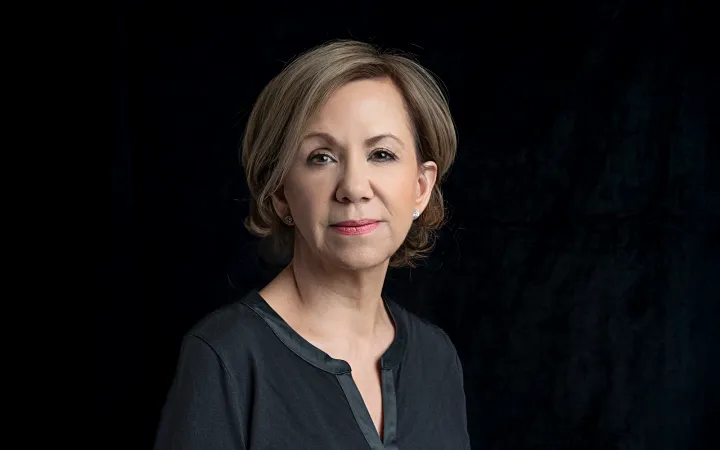El Día del Padre, como cada año para mí, suele pasar fugaz e inadvertido. Además de no ser tan comercial y paralizante como es el Día de la Madre, la respuesta a por qué no logra ese nivel de popularidad, pienso, es porque, así como el mío, 11 millones de hogares mexicanos tienen un padre ausente.
Sin embargo, he de decir que éste fue un poco diferente. La primera razón fue una personal que detallaré más adelante y la segunda fue colectiva: una lectura que al mismo tiempo nos alentó a escribir a muchos.
El nombre de Alma Delia Murillo me era ya conocido. Y aunque admito no había leído ningún libro suyo, sus columnas me habían atrapado desde hace tiempo, pero no tanto como cuando vi en redes sociales la tapa inferior de su reciente novela La cabeza de mi padre y supe que quería leerla porque por primera vez veía algo que me hacía sentirme identificada.
No es que no hubiera leído nunca algún texto donde hubiera padres ausentes y que si bien dice Alma Delia que somos una nación hija de Pedro Páramo, con todas mis disculpas a Juan Rulfo, este libro me acercó más a mis vivencias y vi plasmado en muchas palabras –ahora subrayadas– lo que muchas veces he pensado y sentido. Y que si bien he hablado de mi padre con muchas personas, el diálogo más cercano en mis casi 30 años ha sido con esta novela que me animó a escribir por primera vez parte de mi propia historia de ausencia.
La pregunta “¿por qué lxs hijxs de padres ausentes no hablamos de esto?” comenzó a invadirme página a página y en una sesión de terapia obtuve otra pregunta que de algún modo resolvía esta cuestión: ¿lo evitamos porque nos incomoda o porque incomodamos a los demás?
Haciendo un pequeño repaso con amistades de la música y libros, principalmente, la ausencia del padre está ahí, pero como un elefante en la habitación, y esto me llevó a tener una breve pero agradable plática con la autora.
Para Alma Delia Murillo, la falta de referencias directas a la ausencia de un padre en productos culturales tiene que ver con la proyección colectiva de la fantasía de “familia perfecta”, educada por generaciones desde la Iglesia, política, mercadotecnia donde esta perfección está compuesta por mamá, papá e hijitos, por lo que es muy difícil poner las emociones en la mesa que tienen que ver con nuestro origen para decir “falta una parte”.
En la canción Pa’ dónde se fue, Mon Laferte habla directamente con su padre, que estuvo ausente más de 10 años: “¿qué hice mal, por qué yo te perdí? Sabiendo que envejeces por ahí”, dice un fragmento. Al momento de escribir esto veo que la canción tiene más de 32 millones de reproducciones, es la tercera más popular de la cantante. Al mismo tiempo, La cabeza de mi padre llegó hace unos días –y en menos de dos meses de ser publicado– a su tercer tiraje.
A mis ojos hay una conclusión muy rápida de su popularidad: la representación era necesaria. Sonará paradójico, pero es reconfortante escuchar una canción que pregunta al padre por qué abandonó o leer en una novela lo tedioso que puede ser llenar formularios que no cuentan con el apartado “mi papá me abandonó”, pero sí te preguntan por su edad, dirección, historial de salud o académico, los cuales desconoces. Reconforta porque ves que no estás sola.
El hablar de la ausencia en primera persona no tiene un afán de victimizarnos, es contar en voz alta una historia que se repite en millones y que genera apatía, rencor, dolor, muchas emociones que necesitan encontrar una salida. Es buscar que cuando dices que no tienes padre no tengan que cambiar la conversación “para no incomodarte” o te recuerden –con buena intención, claro– la fortuna de tener a otras personas en tu familia. Lo sabemos.
“No sabemos qué hacer con las emociones que no muestran una cara feliz, las redes han contribuido cabrón a eso. Es un tema fascinante el discurso emocional en lo público, en lo colectivo y en lo privado lo rechazado que está, la forma en que le huimos”.
Tiene pocos años que finalmente he podido hablar de él, con pocas personas, principalmente mi terapeuta. Dije sin vergüenza que cuando cumplí la mayoría de edad fui a buscarlo con mis amigas y después sola, pero no tuve éxito. Hace un año tuve éxito encontrando su fotografía en internet, conocí su rostro y ahora vivo con la tranquilidad de un enigma menos.
“Yo soy de las que buscan. Tengo la maldición, ¿qué le voy a hacer?”.
La literatura y los productos culturales eso suelen hacer: movernos emociones, mientras que, caso contrario, la nota habitual que solamente se publica el tercer domingo de junio con cifras inconclusas de hogares sin un padre no nos mueve nada.
Bien señala Alma Delia: en un país tan machista como México, de cierta forma está permitido que los padres abandonen a sus hijos, pues no tienen consecuencias, simplemente desaparecen sin una persecución social ni legal sobre ellos, como sí se persigue a las mujeres en tantas cosas como el aborto, por ejemplo.
“A la madre que abandona se le considera diabólica, desnaturalizada, un ser demoníaco casi. ¿Cómo es posible? Si la naturaleza de toda mujer tendría que ser ser una madre protectora. En cambio, el padre tiene este permiso tácito para abandonar, por eso pareciera que no es tan relevante (hablar de la ausencia)”.
¿Otras narrativas son posibles?
“Cuando una primera persona se atrevió a dar un paso y decir ‘me sucedió’, otra dijo ‘a mí también’ y luego otra. Entonces es un poco esta resonancia que tiene contar las historias, te hace sentir que no eres la única y creo que hay en que contemos cómo es esto, cuál es la verdadera familia que está latiendo en el corazón de México, que es una familia como la nuestra, incompleta, imperfecta, profundamente humana, con mucha fuerza, con mucho dolor, y que eso tenga un espacio y que no sigamos viendo el modelo de mamá, papá, hijitos que nos hizo sentir avergonzados durante tantos años”.
¿Es momento de cambiar la narrativa? Yo diría que sí.
@toxiicpriinces1
Las opiniones expresadas son responsabilidad de sus autoras y son absolutamente independientes a la postura y línea editorial de Opinión 51.
Más de 150 opiniones a través de 100 columnistas te esperan por menos de un libro al mes. Suscríbete y sé parte de Opinión 51.





Comments ()